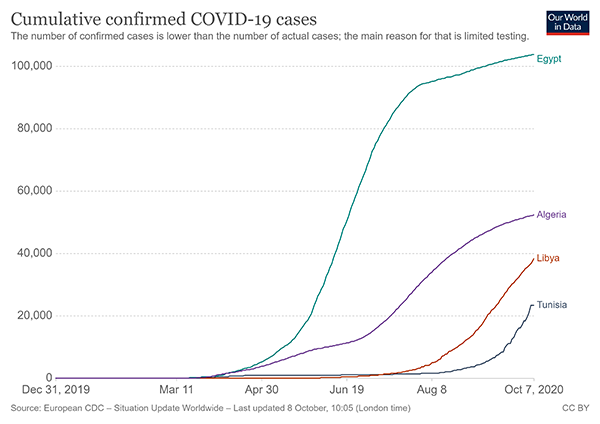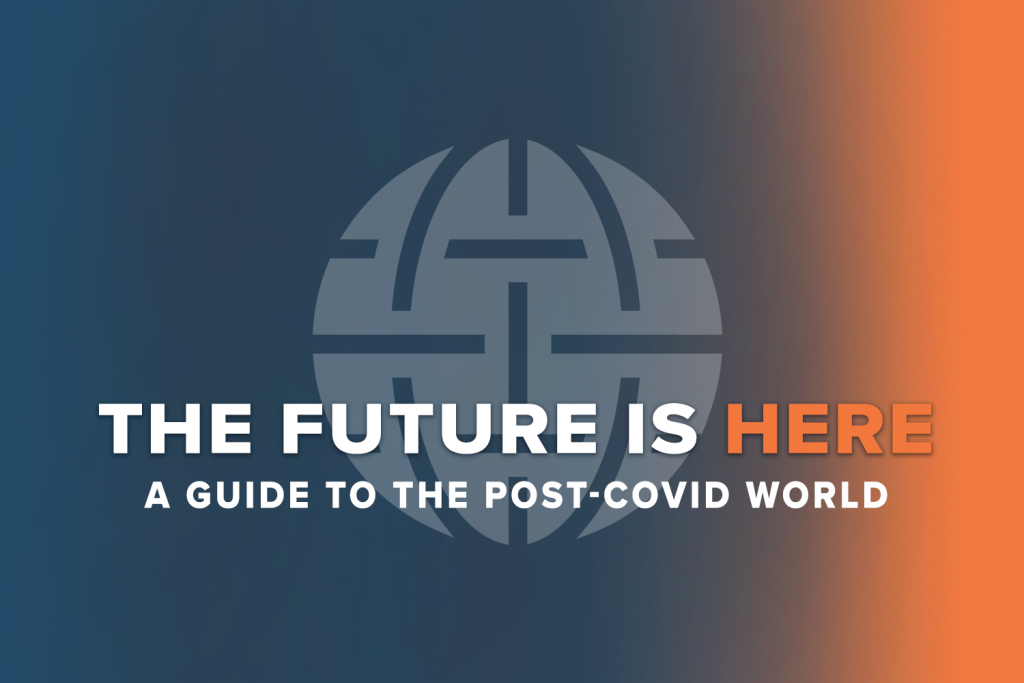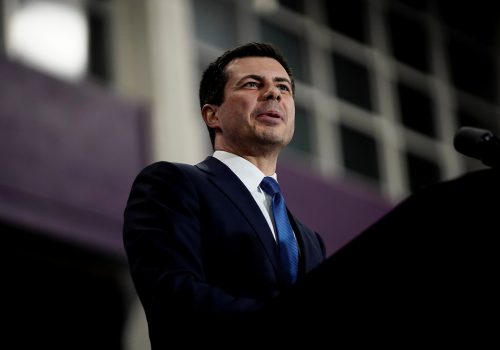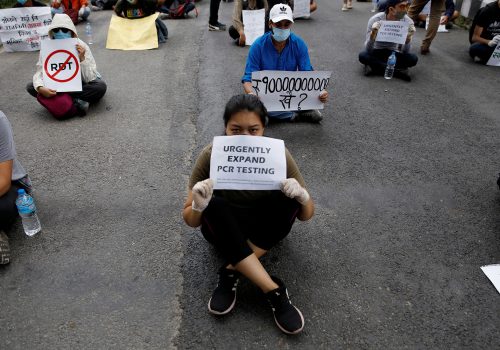The future is here: A guide to the post-COVID world 10/08/2020
Welcome to your guide to where the world is headed during the pandemic era and beyond. Each week, we’ll bring you the latest and most significant expert insights and international news about how coronavirus is reshaping international affairs. To stay updated each week, sign up to the newsletter here.
Let’s take a spin around the globe, in seven minutes or less.
In top stories this week:
- Europe is facing a second wave of infections, and the economic blows and lockdown backlashes that come with it.
- Job markets, roiled by the pandemic, still have pockets of growth—and openings to address long-overlooked challenges.
- Bill Gates has predicted when life will return to normal, and an experimental pass could bring a new normal for air travel.
- But first… we have a special dispatch from Karim Mezran and Lucy Grathwohl of the Atlantic Council’s Rafik Hariri Center. Here’s their take on this week’s big story:
The big story
This week’s key theme: COVID-19 is scrambling power dynamics across the Mediterranean region.
The story of the COVID-19 pandemic is primarily about public health. But it’s also about power. And perhaps nowhere is that becoming most evident than in the Mediterranean. In a new issue brief by the Atlantic Council’s Rafik Hariri Center for the Middle East, we investigate coronavirus’s political, economic, and societal impact in North Africa and the wider region.
Russia and Turkey, for example, are trying to expand their spheres of influence in the Mediterranean, potentially producing a redistribution of power there. And as migration flows from North Africa to Europe ebb or reverse as a result of the pandemic, nationalist political forces across Europe have shifted from championing anti-immigrant agendas to advocating for the self-interest of individual countries over that of the wider European Union.
Subscribe to The future is here: A guide to the post-COVID world
Sign up for a weekly roundup of top expert insights and international news about how coronavirus is reshaping international affairs.

COVID consequences by country
In Libya, the civil war initially overshadowed the outbreak of coronavirus. But now that Khalifa Haftar’s military offensive from the east has been defeated, the population is turning its attention to the virus’s spread and the government’s lack of preparation for fighting it, posing a challenge to the legitimacy of the Government of National Accord in Tripoli. The firm perch that Turkey has now established in Libya promises to reshape the regional energy and economic landscape.
The Tunisian government, by contrast, has swiftly and effectively implemented a preparedness plan to mitigate the spread of the virus, bolstering its standing in the region and relations with Europe. But the pandemic has also magnified pre-existing domestic challenges such as political deadlock, an economic recession, and the risk of the public deficit and debt imploding, which threaten economic reforms that are critical for Tunisia’s future.
In Algeria and Egypt, COVID-19 has hastened economic and social trends already underway. Both regimes have tightened their grip on society and information, invoking the virus to justify crackdowns against dissidents. Egyptian President Abdel Fattah al-Sisi has been more focused on silencing those who criticize the state’s response to coronavirus than on containing the outbreak itself, which further harms the government’s credibility and ability to tackle pressing socio-economic challenges. That, in turn, could frustrate Egypt’s ambitions to regain its position of power in the region. The health crisis has also exacerbated unemployment and added to the economic headwinds that Egypt and Algeria already faced.
The bottom line: To develop effective policy toward North Africa and the Mediterranean, it’s vital to understand the interplay between states’ responses to the pandemic and their struggles to manage conflicts, economic problems, migration, and protest movements—and the ways in which that interplay is remaking the region’s power system.
The big picture
This week’s key theme, visualized: The pandemic is unsettling the Mediterranean.

The world in brief
Insights from across the planet, in ten bullets or fewer
- Most people are still vulnerable to COVID-19, and there are tough times ahead. Only about one in ten people may have been infected with COVID-19, leaving the bulk of the world’s population susceptible to the virus, the World Health Organization (WHO) says. We face a “difficult period” as the disease continues to spread, notes Mike Ryan, the WHO’s top emergency expert.
- Nearing normal by the end of 2021? Industrialized countries could nearly return to “normal” by the end of next year—as long as a COVID-19 vaccine is effective, ready soon, and distributed widely, Microsoft founder Bill Gates predicts. Antibody treatments could cut the death rate from COVID-19 once regulators approve them and they become widely available, the philanthropist also told The Wall Street Journal’s CEO Council Summit. In the UK, meanwhile, less than half of the population can expect to get a COVID-19 shot, with a focus on those at risk, says the head of the government’s vaccine task force.
- Europe, facing restrictions, is foreseeing an economic hit. From limits to alcohol sales in Scotland to bar closures and curbs on opening times in Berlin, Germany; Marseille, France; and Belgium, as well as a country-wide order to wear masks in Poland, governments in Europe are imposing fresh restrictions as they contend with an increase in infections this fall. Europe’s major economies foresee worsening performance because of the second wave of infections, CNBC reports. The Bank of Spain says pandemic restrictions could exacerbate the economic crisis there, while France sees recovery reaching a plateau in the fourth quarter.
- QUOTE: “Countries have preferred localized restrictions as a less costly alternative” to new national lockdowns, writes Ferdinando Giugliano in Bloomberg. “While such ‘smart lockdowns’ seem like a good idea in theory, they’re bound to stir resentment among the regions, cities, and neighborhoods that must suffer them. If targeted measures are to work, politicians will have to win consensus.”
- All is not lost for jobs: Executives say there’s still demand for new hires. New job openings have emerged amid shifting demands and different ways of operating, CNBC reports. A survey of eight hundred business executives worldwide by the consulting firm McKinsey & Company points to increased hiring in health and safety, technology and automation, and digital learning and agile working.
- QUOTE: “The pandemic has been tough on female workers but it presents a chance to fix long-ignored problems,” Sarah O’Connor writes in the Financial Times, citing examples from Japan, the United States, Latvia, Lithuania, and Poland. “Women are over-represented in sectors most hurt by the COVID pandemic.”
- The US deficit has widened, and the interpretations differ. The US trade deficit rose to $67 billion in August, its largest deficit in fourteen years, the Financial Times reports. Meanwhile, China’s purchase of US goods including agricultural products has missed expectations. But a recovery in imports of consumer goods shows that the world trade outlook is brightening, The Wall Street Journal says. The global economy won’t contract as much as the International Monetary Fund (IMF) projected in June, the organization’s Managing Director Kristalina Georgieva said ahead of IMF and World Bank meetings next week.
- Governments worldwide are vying for recovery. Thailand is offering middle-class tax breaks, while Australia is giving incentives for companies to invest again and the United Kingdom is betting on offshore wind. Spain unveiled a plan to spend its way out of recession with $162 billion in European Union aid, The Associated Press reports. Meanwhile, allies of US President Donald J. Trump were stumped by his move to end talks on a new round of stimulus measures ahead of the November election, Bloomberg says.
- The leisure industry is facing the music. The pandemic has dented demand for leisurely activity, impacting sites like theme parks in California and casinos in Las Vegas, Bloomberg Businessweek reports. “A wave of melancholy and nostalgia swept over me” on hearing that Edinburgh’s The Cameo Cinema will close as part of the UK-wide shutdown of Cineworld theaters, Brian Ferguson writes in The Scotsman. The further delay to the release of the latest James Bond blockbuster illustrates the plight that theater chains face.
- A digital pass is aiming to restart international travel. After an almost nine-month hit to global travel, trials of a digital health pass called CommonPass that certifies passengers are free of COVID-19 begin this week, the Financial Times reports. The project’s trials will take place aboard United Airlines and Cathay Pacific flights between London, Hong Kong, New York City, and Singapore. While the platform developed by The Commons Project will not carry out tests, it aims to deliver globally recognized proof that an airline traveler has tested negative before boarding a flight. And it’s backed by the World Economic Forum.
- Religious pilgrimages are facing challenges going all-virtual in the pandemic era. Between three and five million Mouride Brotherhood pilgrims are still expected in the Senegalese city of Touba for a religious festival even though the event’s main ceremony was canceled to deter visitors, Reuters says. While other events are being streamed online, no restrictions are in place to stop the followers from travel to the sacred site. Meanwhile in Mecca, pilgrims have returned in limited numbers as Saudi Arabia eases COVID-19 restrictions, Al Jazeera reports.
- The trapeze are back. With new chalk stains on training mats and ropes that swing again, a circus school in Brussels is welcoming its students back to extend their airborne skills, an Associated Press photo story shows. COVID-19 has led the Superior School of Circus Arts to cut student numbers by 25 percent and create “bubbles” in which small groups work and train together, but the smiles of achievement and elation are still there—just often behind masks.
The inside scoop
Insights from the Atlantic Council



